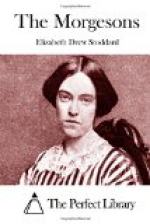by woods of oak and pine, intersected by crooked roads,
which led to towns and villages near us. The
inland scenery was tame; no hill or dale broke its
dull uniformity. Cornfields and meadows of red
grass walled with gray stone, lay between the village
and the border of the woods. Seaward it was enchanting—beautiful
under the sun and moon and clouds. Our family
had lived in Surrey for years. Probably some Puritan
of the name of Morgeson had moved from an earlier
settlement, and, appropriating a few acres in what
was now its center, lived long enough upon them to
see his sons and daughters married to the sons and
daughters of similar settlers. So our name was
in perpetuation, though none of our race ever made
a mark in his circle, or attained a place among the
great ones of his day. The family recipes for
curing herbs and hams, and making cordials, were in
better preservation than the memory of their makers.
It is certain that they were not a progressive or
changeable family. No tradition of any individuality
remains concerning them. There was a confusion
in the minds of the survivors of the various generations
about the degree of their relationship to those who
were buried, and whose names and ages simply were cut
in the stones which headed their graves. The
meum and
tuum of blood were inextricably
mixed; so they contented themselves with giving their
children the old Christian names which were carved
on the headstones, and which, in time, added a still
more profound darkness to the anti-heraldic memory
of the Morgesons. They had no knowledge of that
treasure which so many of our New England families
are boastful of—the Ancestor who came over
in the Mayflower, or by himself, with a grant of land
from Parliament. It was not known whether two
or three brothers sailed together from the Old World
and settled in the New. They had no portrait,
nor curious chair, nor rusty weapon—no old
Bible, nor drinking cup, nor remnant of brocade.
Morgeson—Born—Live
d—Died—were
all their archives. But there is a dignity in
mere perpetuity, a strength in the narrowest affinities.
This dignity and strength were theirs. They are
still vital in our rural population. Occasionally
something fine is their result; an aboriginal reappears
to prove the plastic powers of nature.
My great-grandfather, Locke Morgeson, the old man
whose head I saw bound in a red handkerchief, was
the first noticeable man of the name. He was
a scale of enthusiasms, ranging from the melancholy
to the sarcastic. When I heard him talked of,
it seemed to me that he was born under the influence
of the sea, while the rest of the tribe inherited
the character of the landscape. Comprehension
of life, and comprehension of self, came too late
for him to make either of value. The spirit of
progress, however, which prompted his schemes benefited
others. The most that could be said of him was
that he had the rudiments of a Founder.




